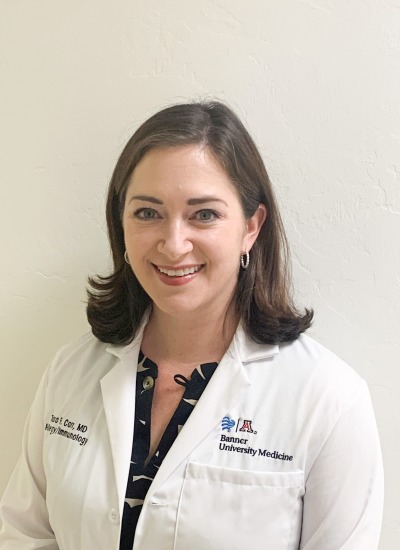Medicine
Tara F Carr
Work Summary
Dr Tara Carr is a board certified Allergist/Immunologist physician and Associate Professor at the University of Arizona. She is focused on studying the impact of environmental exposures on development and heterogeneity of allergic disease, with an emphasis on asthma. Her highly collaborative lab at Bio5 serves as biorepository for multiple clinical cohorts, and utilizes a broad range of experimental methods to describe the immunological characteristics of asthma and allergic disease.
Research Interest
Fariba Donovan
Work Summary
As both a research scientist and practicing infectious disease clinician I remain keenly aware of the importance of the practical application of basic research, to the broader problems we face treating patients with both invasive and opportunistic fungal infections. My main research interest focuses on the evaluation of early events involved with coccidioidomycosis.
Research Interest
Ruslan Rafikov
Work Summary
Dr. Rafikov laboratory is focused on molecular mechanisms of pulmonary vascular cell dysfunction in pulmonary hypertension and acute lung injury. The lab is exploring mechanisms of metabolic reprogramming, mitochondrial dysfunction, and proliferative signaling.
Research Interest
Rachna Shroff
Work Summary
Dr. Rachna Shroff is the Chief of GI Medical Oncology at the University of Arizona Cancer Center (UACC) where she also serves as the Director of the Clinical Trials Office. Within the UA College of Medicine Tucson, she is the Associate Dean for Clinical and Translational Research. Dr. Shroff is a clinical and translational investigator focused on dveloping novel targeted therapies and immunotherapies for pancreatic and hepatobiliary cancers and has led multiple clinical trials in this space.
Research Interest
Sairam Parthasarathy
Work Summary
Dr. Parthasarathy has expertise in noninvasive home ventilation for sleep-related breathing disorders and invasive ventilation in critically ill patients. His major areas of focus have been in promoting adherence to nonivasive ventilation devices in the home setting and patient-ventilator interaction during critical illness. He serves as Chief of Division of Pulmonary, Allergy, Critical Care & Sleep Medicine at COM-T and as a Special Advisor to NH/NHLBI.
Research Interest
Juanita L Merchant
Research Interest
Jennifer H Stern
Research Interest
Jil C Tardiff
Research Interest
Marvin J Slepian
Research Interest
Pagination
- Page 1
- Next page











